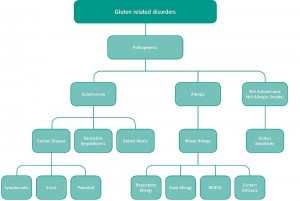An allergy to gluten is on the gluten sensitivity spectrum. Are you allergic to gluten, do you have celiac, or are you just fooling yourself? We’ll take a closer look.
Gluten sensitivity is a catch-all phrase meaning gluten has an adverse effect on the body. This can range from mild symptoms such as upset stomach and a bit of fatigue, through to serious health conditions such as diabetes, thyroid disorders and feeling practically brain-dead.
 Gluten Sensitivity (click to view larger)
Gluten Sensitivity (click to view larger)
An allergy to gluten falls in the middle of the range between celiac-driven autoimmune disorders and similar problems and mild gluten sensitivity which is neither autoimmune nor an allergy. See the Gluten Related Disorders article for more details about the gluten sensitivity spectrum.
An allergy to gluten can have a range of symptoms, which vary greatly from one person to the next. Many of these symptoms can be similar to celiac disease, but there are important differences.
See the Gluten Allergy Symptoms and Celiac Disease Symptoms articles for more details.
There are many types of gluten: each grain has it’s own unique type. When talking about celiac disease, it is the gluten in wheat, barley, rye and oats that are of concern, although there is debate over oat gluten (I suggest celiacs avoid oats).
An gluten allergy however could possibly exclude some or all of the above (although most people with an allergy to gluten are probably allergic to wheat gluten) and may include gluten found in rice, corn or other grains.
Allergy to Gluten Important Questions
There are some important questions you need to find answers to if you suspect you are gluten-intolerant.
The most important question is: do you actually have celiac disease? If so, you must avoid all gluten, even if you feel fine after eating small amounts, otherwise you risk developing very severe secondary diseases such as cancer. On the other hand, if you are very strict about avoiding gluten regardless, a medical diagnosis for or against celiac is less critical (although some countries allow tax right-offs for more expensive gluten-free food if you have a celiac diagnosis).
Assuming you don’t have celiac, you need to know what your tolerance for gluten allergy symptoms are. If you find them mild, you might go ahead and eat small amounts of gluten. If you find them debilitating, you should avoid all gluten.
What is your experience with an allergy to gluten? Please leave a comment, a story or a question.